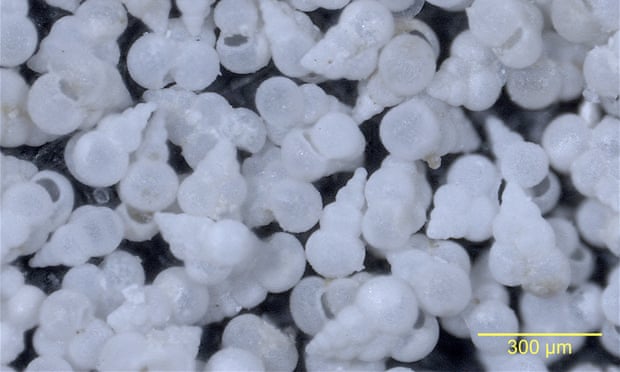Heterohelix globulosa foraminifera isolated from the K-Pg boundary clay at Geulhemmerberg in the Netherlands, shown at 8x magnification.
Study confirms fear that intense ocean acidification portends ecological catastrophe: ‘We have been warned’
Study confirms fear that intense ocean acidification portends ecological catastrophe: ‘We have been warned’
Photograph: Michael J. Henehan/PNAS
From The Guardian
Carbon emissions make sea more acidic, which wiped out 75% of marine species 66m years ago
Ocean acidification can cause the mass extinction of marine life, fossil evidence from 66m years ago has revealed.
A key impact of today’s climate crisis is that seas are again getting more acidic, as they absorb carbon emissions from the burning of coal, oil and gas.
Scientists said the latest research is a warning that humanity is risking potential “ecological collapse” in the oceans, which produce half the oxygen we breathe.
The researchers analysed small seashells in sediment laid down shortly after a giant meteorite hit the Earth, wiping out the dinosaurs and three-quarters of marine species.
Chemical analysis of the shells showed a sharp drop in the pH of the ocean in the century to the millennium after the strike.
This spike demonstrated it was the meteorite impact that made the ocean more acidic, effectively dissolving the chalky shells of many species.
Large-scale volcanic activity was also considered a possible culprit, but this occurred over a much longer period.
The Cretaceous-Palaeogene boundary at Geulhemmerberg, in the Netherlands, where boundary clay samples were taken.
credit : Michael Henehan
The oceans acidified because the meteorite impact vaporised rocks containing sulphates and carbonates, causing sulphuric acid and carbonic acid to rain down.
The mass die-off of plants on land after the strike also increased CO2 in the atmosphere.
“We show ocean acidification can precipitate ecological collapse,” said Michael Henehan at the GFZ German research centre for geosciences in Potsdam, who led the study.
“Before we had the idea, but we did not have the empirical proof.”
The researchers found that the pH dropped by 0.25 pH units in the 100-1,000 years after the strike.
It is possible that there was an even bigger drop in pH in the decade or two after the strike and the scientists are examining other sediments in even finer detail.
Henehan said: “If 0.25 was enough to precipitate a mass extinction, we should be worried.” Researchers estimate that the pH of the ocean will drop by 0.4 pH units by the end of this century if carbon emissions are not stopped, or by 0.15 units if global temperature rise is limited to 2C.
Henehan said: “We may think of [acidification] as something to worry about for our grandchildren.
But if it truly does get to the same acidification as at the [meteorite strike] boundary, then you are talking about effects that will last for the lifetime of our species.
It was hundreds of thousands of years before carbon cycling returned to normal.”
The research, published in the journal Proceedings of the National Academy of Sciences, analysed sediments that Henehan encountered by chance, during a conference field trip in the Netherlands.
The sediments, which straddle the moment of the impact, lie in caves that were used by people hiding from the Nazis during the second world war.
“It was so lucky,” said Henehan.
The rocks contained foraminifera, small-shelled marine organisms.
“In the boundary clay, we managed to capture them just limping on past the asteroid impact.
But you can see their shell walls were much thinner and poorly calcified after the impact,” he said.
It was the knock-on effects of acidification and other stresses, such as the “nuclear winter” that followed the impact, that finally drove these foraminifera to extinction, he said: “You have the complete breakdown of the whole food chain.”
He said oceans also faced additional stresses today, from global heating to widespread pollution, overfishing and invasive alien species.
When the Chicxulub asteroid landed in what is today Mexico, it didn't just extinguish the dinosaurs. It devastated life in the oceans, too.
Phil Williamson, at the University of East Anglia, who was not involved in the research, said: “It is relatively easy to identify mass extinction events in the fossil record, but much harder to know exactly what caused them. Evidence for the role of ocean acidification has generally been weak, until now.”
He said caution was needed in making the comparison between the acidification spike 66m years ago and today: “When the asteroid struck, atmospheric CO2 was naturally already much higher than today, and the pH much lower.
Furthermore, large asteroid impacts cause prolonged darkness.”
Williamson added: “Nevertheless, this study provides further warning that the global changes in ocean chemistry that we are currently driving have the potential to cause highly undesirable and effectively irreversible damage to ocean biology.”
Henehan said the generally lower ocean pH 66m years ago might have made shelled organisms more resilient to acidification.
“Who knows if our current [marine] system is as well set up to cope with sudden acidification?”
Links :
- YaleNews : Mystery solved: ocean acidity in the last mass extinction
- CNN : Tiny shell fossils reveal how ocean acidification can cause ...
- NYTimes : The Dinosaur-Killing Asteroid Acidified the Ocean in a Flash
- Oceanographic Mag : Study reveals ocean acidification has caused mass extinctions
- Phys : Mystery solved: Ocean acidity in the last mass extinction
- CNET : Dinosaur-killing asteroid rapidly turned oceans to acid, disrupted climate
- Yale : Farmed Oysters Show Resilience to Ocean Acidification
- Hawaï News : Climate Change, Explained: What is ocean acidification?
- GeoGarage blog : Ocean acidification is deadly threat to ... / 'The other CO2 problem': How acidic oceans .. / Satellite images to monitor ocean acidification in remote areas ... / The seafloor is dissolving, thanks to human ... / An acid test for policy / Study: our oceans are so acidic they're ...



No comments:
Post a Comment